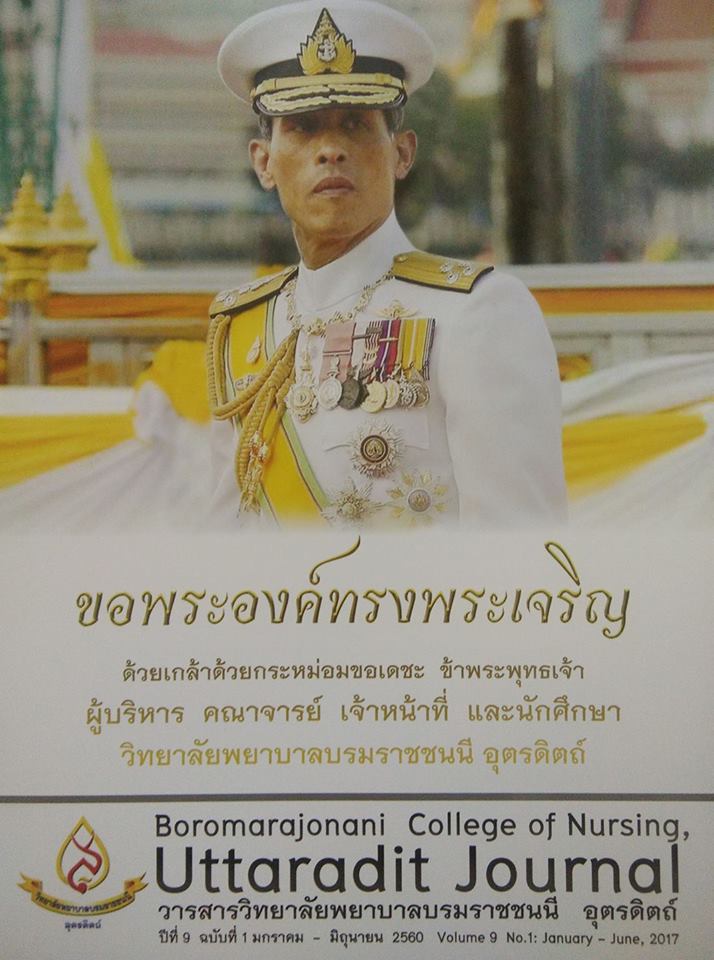การออกกําลังกายของผู้สูงอายุ: ประยุกต์ใช้ทฤษฎีสมรรถนะแห่งตน
Main Article Content
บทคัดย่อ
การส่งเสริมให้ผู้สูงอายุมีพฤติกรรมการออกกำลังกายนั้นเป็นสิ่งที่มีความสำคัญเป็นอย่างยิ่ง โดยการปรับเปลี่ยนพฤติกรรมการออกกำลังกายเป็นหลักการที่สำคัญอย่างหนึ่งที่ควรจะต้องทำร่วมกับการ
รักษาด้วยวิธีอื่นๆ เพื่อควบคุมและป้องกันการเกิดภาวะแทรกซ้อนต่างๆ การที่ผู้สูงอายุจะทำการปรับเปลี่ยนพฤติกรรมการออกกำลังกายได้นั้น การรับรู้สมรรถนะในตนเองเป็นปัจจัยหนึ่งที่มีความสำคัญเนื่องจากผู้สูงอายุที่ได้รับการส่งเสริมสมรรถนะในตนเองจะเกิดการรับรู้สมรรถนะในตนเองเพิ่มขึ้น ส่งผลให้ผู้สูงอายุมีการปรับเปลี่ยนพฤติกรรมในการออกกำลังกายและทำให้เกิดความมั่นใจในสมรรถนะแห่งตนในการที่จะปฏิบัติพฤติกรรมการออกกำลังกายได้อย่างถูกต้อง เหมาะสม และยั่งยืนต่อไป
Article Details
บทความหรือข้อคิดเห็นใดใดที่ปรากฏในวารสารวิจัยการพยาบาลและวิทยาศาสตร์สุขภาพ เป็นวรรณกรรมของผู้เขียน ซึ่งบรรณาธิการหรือสมาคมศิษย์เก่า ไม่จำเป็นต้องเห็นด้วย และบทความที่ได้รับการตีพิมพ์เผยแพร่ถือเป็นลิขสิทธิ์ของวารสารวิจัยการพยาบาลและวิทยาศาสตร์สุขภาพ
เอกสารอ้างอิง
2. American College of Spots Medicine. (2010). ACSM’s Resource Manual for Guidelines for Exercise Testing and Prescription. (6thed). Philadelphia : Lippincott Williams & Wilkins.
3. Bandura, A. (1997). Self-efficacy and health behaviour. In A. Baum, S. Newman, J. Wienman, R. West, & C. McManus (Eds.), Cambridge handbook of psychology, health and medicine (pp. 160-162). Cambridge: Cambridge University Press.
4. Bandura, A. (1997). Self-Efficacy : The exercise of control. New York: W.H. Freeman and Company. Bandura, A. (2004). Self-efficacy.In N. B. Anderson (Ed.) Encyclopedia of health & behavior (Vol. 2, pp. 708-714). Thousand Oaks: Sage Publications.
5. Bandura, A. (2006). Guide for constructing self- efficacy scales. In F. Pajares& T. Urdan (Eds.), Self-efficacy beliefs of adolescents (Vol. 5, pp. 307-337).Greenwich, CT: InformationAge Publishing.
6. Belza, B., Walwick, J., Shiu-Thornton, S., Schwartz,S., Taylor, M., and Lo Gerfo, J. (2004). Older adult perspectives on physical activity and exercise: Voices frommultiple cultures.Preventing Chronic Disease, 1(4) : 4-28.
7. Elipoulos, C. (2014). Gerontological nursing. (8th ed). Philadelphia, PA: Wolters Kluwer Health/ Lippincott Williams and Wilkins. Dajpratham, P. (2013). Dysphagia in Elderly .J Thai Rehabil Med. 23(3): 73-80. (in Thai)
8. Panyoyai, P. (2007). Effect of the self efficacy and social support enhancement program on exercise behavior among the elderly with diabetes mellitus. ( in Thai)
9. Panyoyai, P. (2007). Effect of the self efficacy and social support enhancement program on exercise behavior among the elderly with diabetes mellitus. Dissertation, Chiang Mai University (in Thai)
10. Pender, N. J., Murdaugh, C. L., & Parsons, M. A. (2006).Individual models to promote health behavior. In N. J. Pender, C. L. Murdaugh, & M. A. Parsons (Eds.), Health promotion in nursing practice. (pp. 147-171). New Jersey:
Upper Saddle River.


